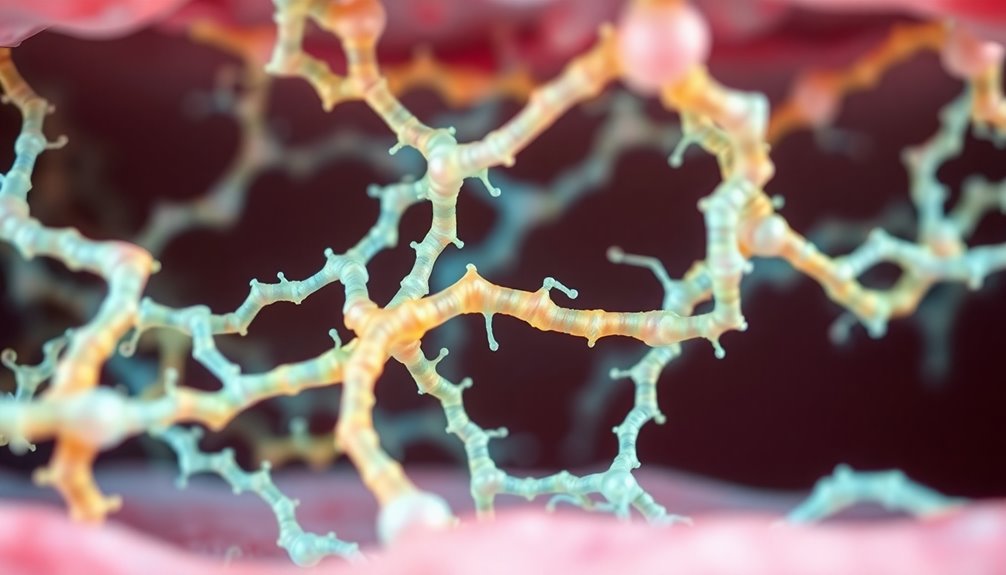Collagen Type IV plays an important role in your skin's regeneration process by providing structural support and regulating cell behavior in the basement membrane. This collagen type aids in wound healing, tissue compartmentalization, and maintaining the integrity of your skin's structure. It's essential for maintaining blood vessel integrity and contributes greatly to the overall health of your skin. Understanding the importance of Collagen Type IV in skin regeneration can lead to deeper insights into how it impacts skin health, maintenance, and integrity, making it a cornerstone for healthy and vibrant skin.
Key Takeaways
- Collagen Type IV is crucial in skin regeneration by providing structural support and regulating cell behavior.
- Found in the basement membrane, it aids in wound healing and tissue compartmentalization.
- Contributes to blood vessel integrity and skin structure, essential for skin health.
- Important for eccrine glands and utilized in immunohistochemical staining for skin analysis.
- Mutations affecting collagen IV genes impact skin regeneration and overall skin health.
Type IV Collagen Basics
Playing an essential role in skin structure and regeneration, Type IV collagen serves as a foundational element within the skin's basement membrane. This collagen type forms intricate networks within the basement membrane, providing structural support and regulating cell behavior in the skin.
Mutations in genes responsible for encoding type IV collagen chains can result in various skin diseases, impacting skin regeneration processes. Type IV collagen is vital for wound healing, maintaining skin structure, and supporting tissue compartmentalization.
Understanding the functions and distribution of Type IV collagen is necessary for comprehending skin regeneration mechanisms and developing potential therapeutic interventions. By delving into the basics of Type IV collagen, researchers can uncover valuable insights into how this collagen type influences skin health, repair, and resilience, paving the way for advancements in dermatology and wound care.
Collagen IV in Basement Membrane
Collagen Type IV, a key component of the skin's basement membrane, provides essential structural support and integrity. This protein, a main constituent of type IV collagen, forms intricate networks within the basement membrane, essential for maintaining the skin's architecture.
Studies have shown that collagen IV in the basement membrane plays a crucial role in regulating cell behavior, organizing tissue compartments, and modulating signaling pathways essential for skin regeneration. Additionally, collagen IV is involved in supporting the integrity of blood vessels within the skin, contributing to overall skin health and function.
Abnormalities in collagen IV expression can disrupt these functions, impacting skin regeneration processes. Understanding the distribution and function of collagen IV in the skin basement membrane is key for advancing research on skin regeneration and developing targeted interventions for skin conditions related to basement membrane integrity.
Collagen IV and Embryogenesis
In the context of embryogenesis, the role of Collagen IV takes on an essential significance as it contributes to the structural framework necessary for the development of tissues and organs. Collagen IV plays a critical role in providing structural support during embryonic development, aiding in the formation of basement membranes essential for tissue organization and organogenesis. It facilitates cell adhesion and signaling processes, necessary for proper differentiation and growth of tissues. Abnormal collagen IV expression can result in developmental defects, impacting the formation of organs.
The presence of collagen IV in the basement membrane is crucial for maintaining the structural integrity and function of developing tissues and organs. Overall, collagen IV plays a key role in embryogenesis by ensuring proper structural support, cell adhesion, and signaling mechanisms are in place for the successful development of tissues and organs.
Antibodies to Collagen IV
Detection of antibodies to collagen IV plays a vital role in diagnosing and understanding autoimmune disorders that impact the skin. These antibodies are found around nerves, blood vessels, and sweat glands in the skin, indicating their diverse roles in skin physiology.
Staining patterns of collagen type IV antibodies can reveal specific changes in skin structure associated with diseases like lupus erythematosus. Utilizing immunohistochemistry for detecting collagen IV antibodies aids in distinguishing epidermal and subepidermal blistering diseases affecting the skin.
Collagen IV in Alport Syndrome
Antibodies to collagen IV have been essential in uncovering insights into autoimmune disorders affecting the skin. In the case of Alport syndrome, mutations in the COL4A3, COL4A4, and COL4A5 genes result in altered type IV collagen within the basement membrane of the skin. This disruption leads to skin abnormalities such as fragility, blistering, and impaired wound healing.
The presence of type IV collagen abnormalities in Alport syndrome profoundly impacts skin integrity, causing manifestations like skin fragility and delayed wound healing.
Understanding the role of collagen IV in Alport syndrome is pivotal for developing targeted therapies that address the skin manifestations of the disease. By delving into the specific effects of collagen IV mutations on the skin's basement membrane, researchers can potentially devise interventions that promote skin regeneration and overall disease management for individuals with Alport syndrome.
This knowledge opens up avenues for tailored treatments that aim to alleviate the skin-related symptoms associated with this genetic disorder.
Goodpasture Syndrome and Collagen IV
Targeting collagen IV in the basement membranes of the kidneys and lungs, Goodpasture syndrome is an autoimmune disorder characterized by the immune system's attack on this crucial structural protein. Antibodies directed against collagen IV lead to glomerulonephritis and lung hemorrhage, impacting the integrity of these tissues.
Diagnosis involves detecting anti-collagen IV antibodies, with treatment focusing on immunosuppressive therapy and plasmapheresis to manage the condition.
The immune system's assault on collagen IV in the basement membranes of the kidneys and lungs underlies the pathology of Goodpasture syndrome, emphasizing the importance of immune tolerance and basement membrane health in preventing autoimmune diseases. Understanding the role of collagen IV in this syndrome sheds light on the significance of preserving the structural integrity of basement membranes to prevent autoimmune attacks on essential proteins.
Collagen IV in Wound Healing
Playing a central role in the intricate process of wound healing, collagen IV forms a structural framework within the skin's basement membrane. This essential collagen type IV in the skin's basement membrane zone not only provides support but also facilitates vital functions like cell migration, proliferation, and tissue repair.
Collagen IV works in harmony with other components of the extracellular matrix, regulating signaling pathways crucial for efficient wound healing. Disruptions in collagen IV expression have been linked to impaired wound healing and abnormal skin regeneration.
Understanding the significance of collagen IV in wound healing is essential for developing effective strategies to promote optimal skin regeneration and tissue repair. By ensuring proper collagen deposition and maintenance within the basement membrane, the intricate dance of cell migration and tissue repair can proceed smoothly, ultimately leading to successful wound healing and skin regeneration.
Collagen IV in Skin
Collagen IV forms an essential component of the skin's basement membrane zone, serving a vital role in maintaining skin integrity and function. Antibody staining techniques can reveal distinct patterns of collagen IV distribution in the skin, aiding in the diagnosis of autoimmune diseases such as lupus erythematosus.
This collagen type is strategically located around nerves, blood vessels, and sweat glands, providing structural support to these essential skin elements. Mutations in the genes encoding collagen IV chains are linked to conditions like hereditary nephropathy and various skin disorders, emphasizing the importance of collagen IV in skin health.
Changes in collagen IV distribution can have significant effects on skin function, highlighting its relevance in processes related to skin regeneration. Understanding the function and distribution of collagen IV in the skin is critical for managing skin disorders, autoimmune conditions, and promoting skin integrity.
Collagen IV Research Findings
In exploring Collagen IV research findings, an intriguing aspect emerges regarding its significant role in skin regeneration and maintenance. Type IV collagen plays a pivotal role in the skin's basement membrane zone, contributing to skin integrity and structure. Studies have shown the presence of collagen IV in skin blood vessels, with Texas Red being utilized for visualization.
In normal skin blood vessels, collagen IV antibodies are present, highlighting the importance of this protein. Additionally, research has demonstrated the staining of collagen IV in eccrine glands, particularly in eccrine gland ducts. Immunohistochemical (IHC) staining of eccrine glands further emphasizes the significance of collagen IV in maintaining skin function.
These findings underscore the vital role collagen IV plays in skin health, wound healing, and overall skin structure. Understanding the distribution and function of collagen IV in normal skin conditions provides insights into its potential implications in various skin diseases and regeneration processes. Collagen IV has also been implicated in the skin’s response to UV radiation, suggesting a potential role in sun protection. Furthermore, disruptions in collagen IV in the skin have been linked to conditions such as epidermolysis bullosa and certain types of skin cancer, highlighting the importance of maintaining its proper function. These insights into collagen’s role in sun protection and skin health could lead to the development of new therapies and interventions for a range of skin conditions.
Conclusion
To sum up, collagen type IV plays a vital role in skin regeneration and wound healing. Its presence in the basement membrane helps maintain skin integrity, and research has shown its significance in various skin conditions such as Alport Syndrome and Goodpasture Syndrome. By understanding the role of collagen IV in skin biology, we can potentially develop new therapies to enhance wound healing and promote skin regeneration.


